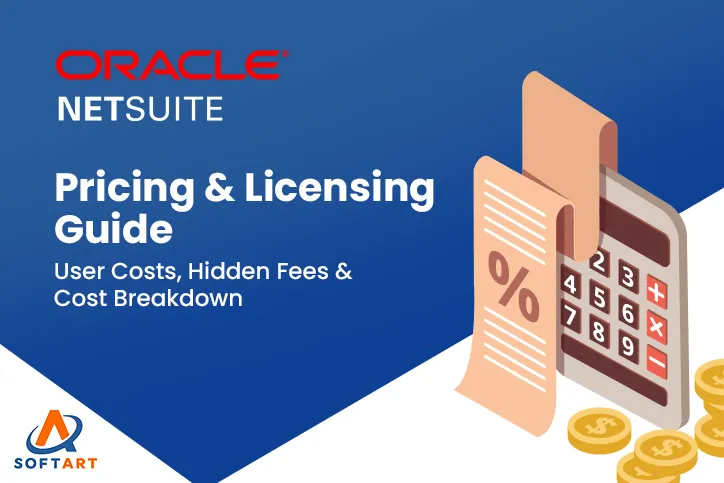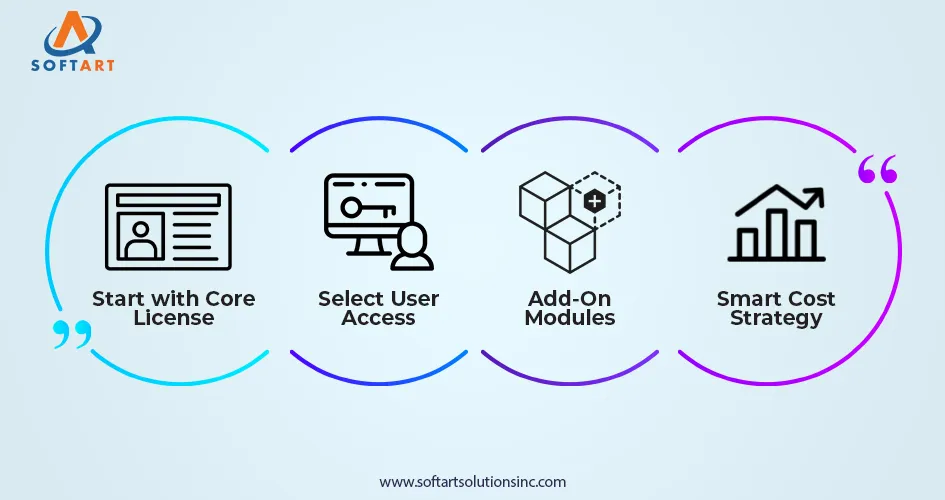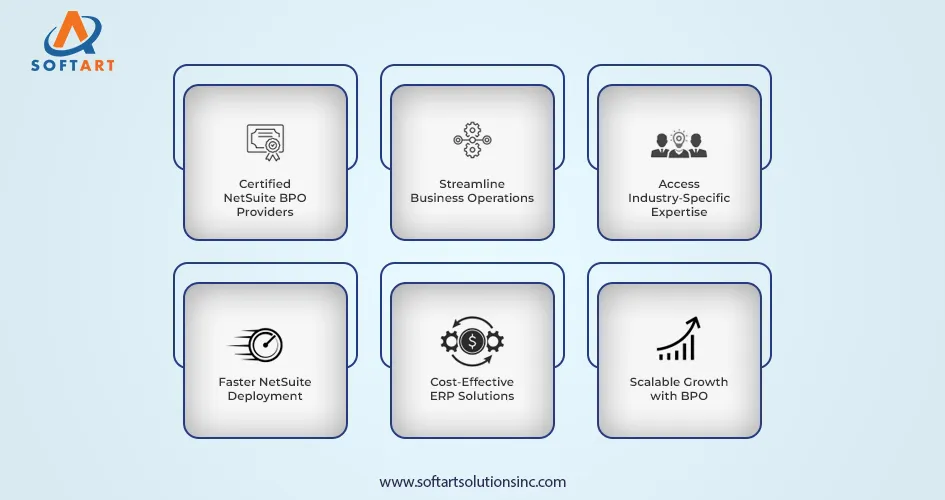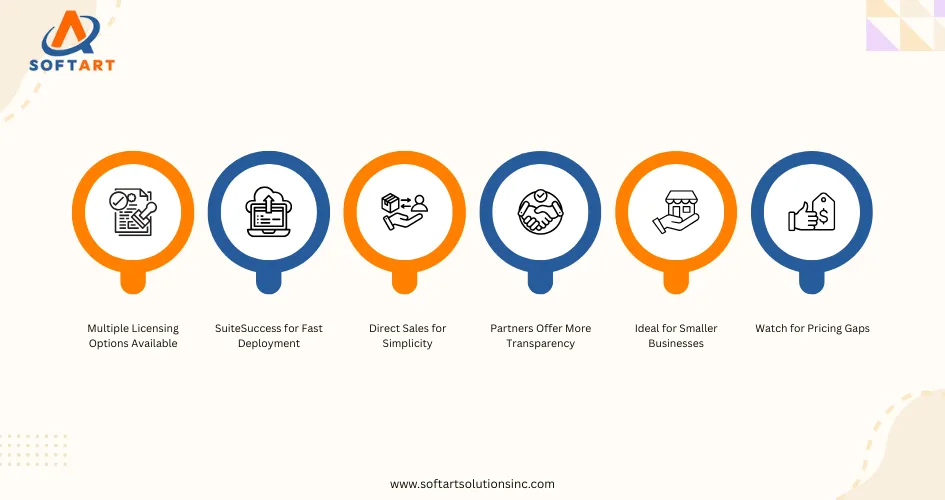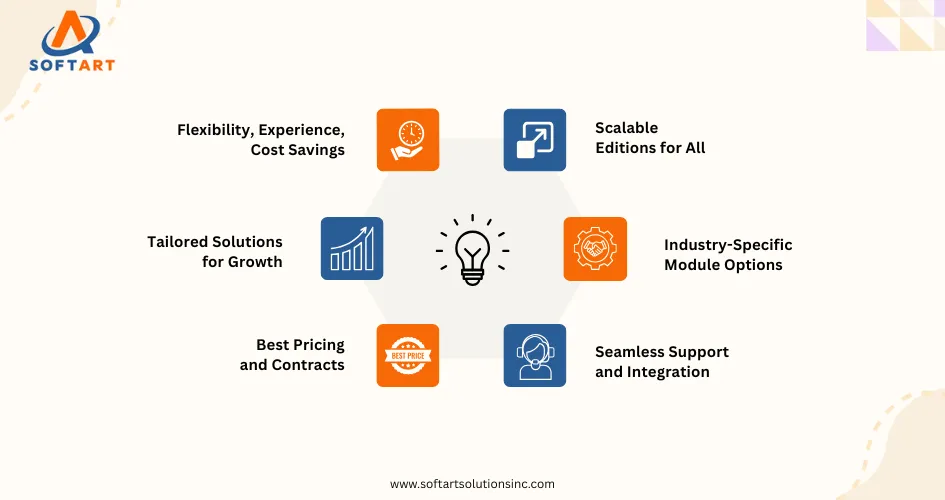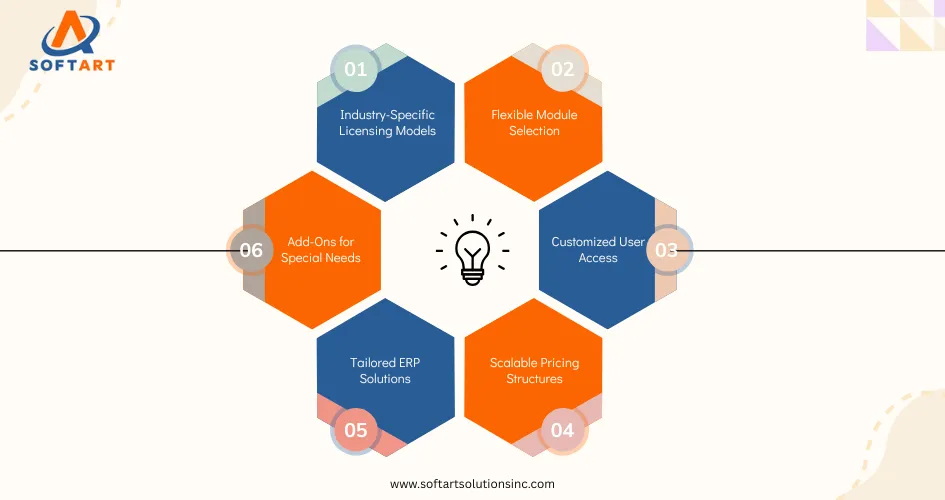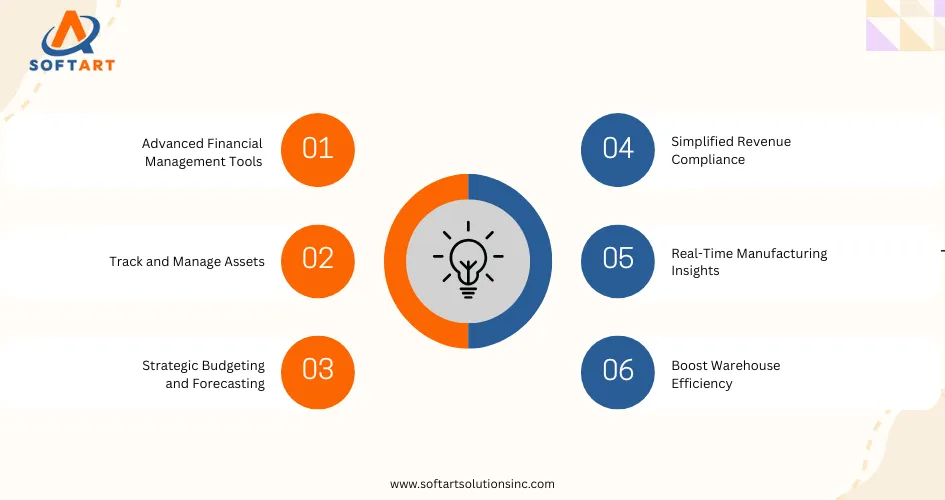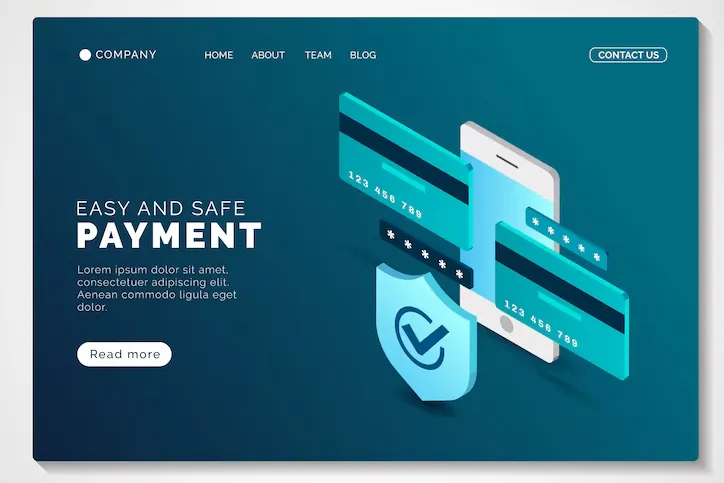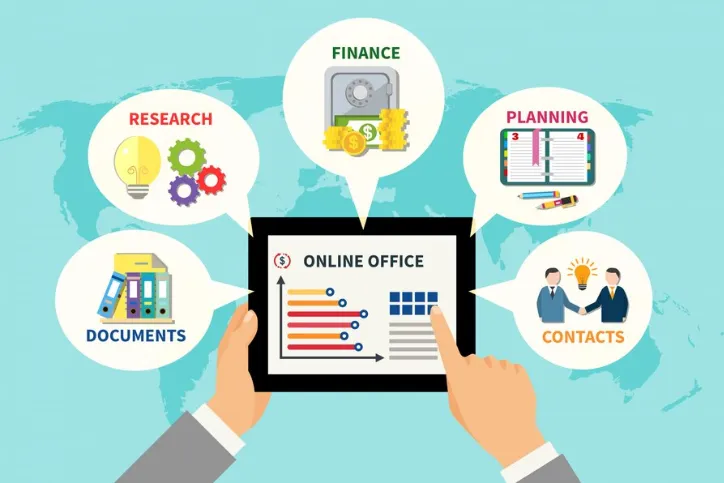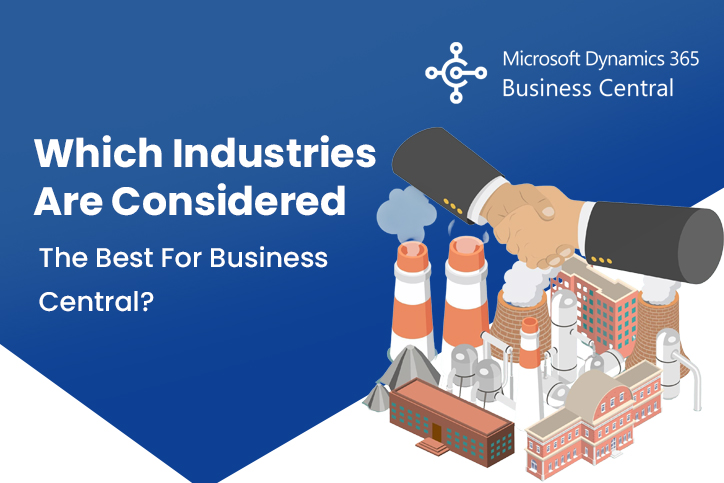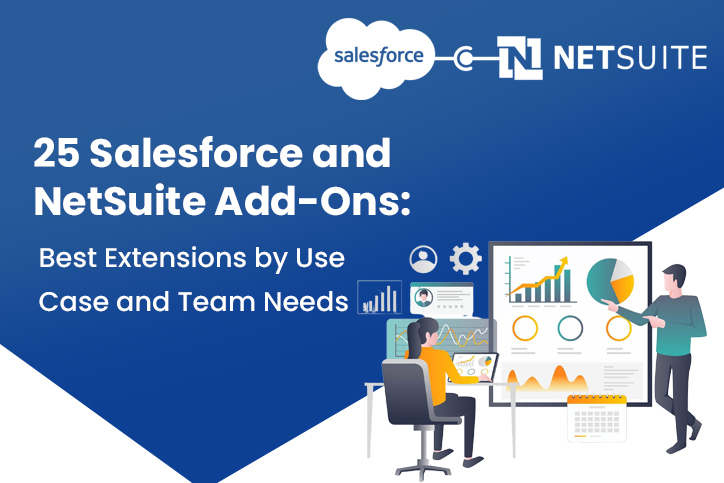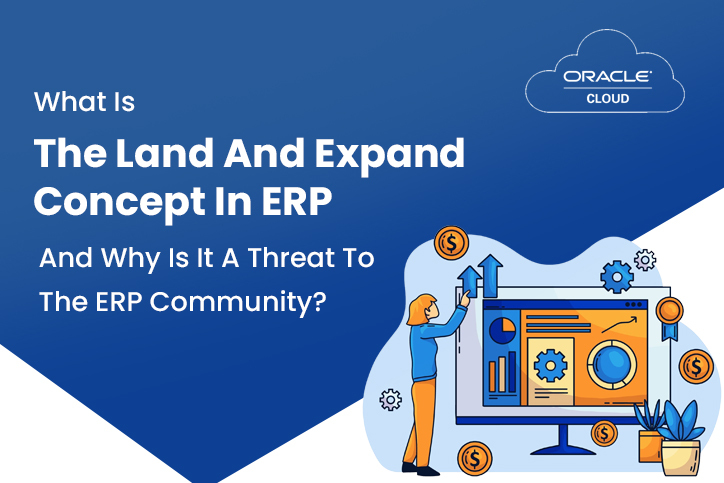Is NetSuite on your consideration list, but you are concerned about the pricing? You’re not alone! NetSuite pricing is not one-size-fits-all and can seem tricky, since it depends heavily on the number of users, required modules, customizations or integrations. Add-ons and Suiteapps subscriptions can also add to your expense, and without knowing your unique needs it’s impossible to give you an exact price. Whether you’re calculating NetSuite licences cost or Netsuite Implementation cost, understanding the key factors will help you make an informed decision.
Before diving into any sort of analysis of NetSuite licensing costs, it is important to understand the differences between full user licenses, employee licenses, and role-based pricing. That’s why, we’re breaking down those pricing pieces and giving you general rules of thumb to inform your estimates with confidence.
NetSuite Pricing & Licensing – Simplified in 3 Easy Steps
Planning your NetSuite deployment? Understanding its pricing is just as important. Explore our simplified 3-step guide to NetSuite Pricing & Licensing and make budgeting hassle-free.
Step 1: Choose Your Base Package:
- Start with a core NetSuite license, which includes base ERP functionality.
- Estimated cost: Starts at $1,000+ per month, depending on your chosen edition and organization size.
- Each edition offers scalable features for startups to large enterprises.
Step 2: Choose the Number of Users:
- NetSuite uses a named user licensing model—each user needs their own license.
- User cost varies based on access level (standard users, full-access users, etc.).
- Ensure you license only the necessary team members to control costs.
Step 3: Choose Your Add-On Modules:
- Add modules based on your business needs:
- Advanced Financials
- SuiteCommerce
- Supply Chain Management, etc.
- Module pricing ranges from $550 to $1,550/month, depending on the features.
- You can also opt for SuiteSuccess industry packages for simplified deployment.
With a clear understanding of NetSuite’s pricing structure—from core packages to user licenses and add-on modules—you can plan smarter and invest more confidently. Choose what fits your business today and scale effortlessly.
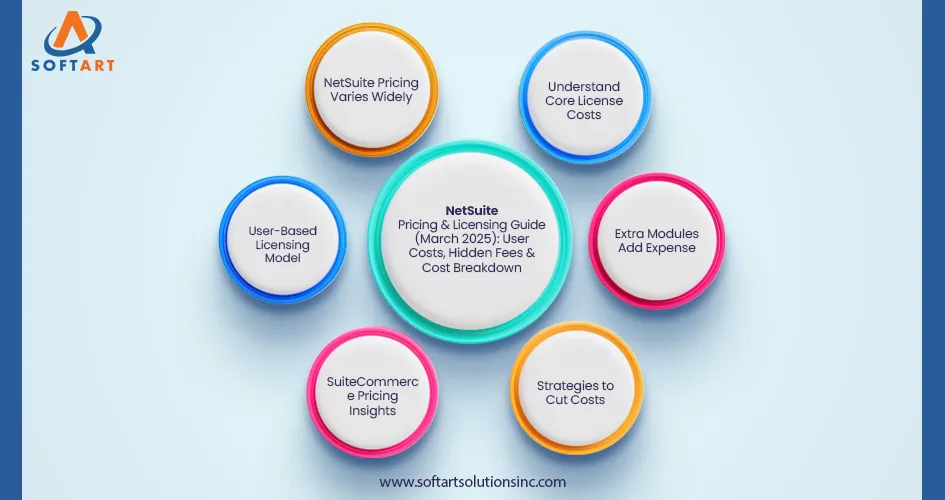
NetSuite User Licensing Costs
Understanding NetSuite’s cost per user is crucial for controlling expenses and providing employees with suitable access. NetSuite operates on a named user basis, meaning every person needing system access must have their own individual license.
The edition of NetSuite your business requires depends on the number of full user licenses you need. By evaluating Oracle NetSuite pricing carefully, you can optimize costs and choose the most suitable package.
Different Types of NetSuite User Licenses
- Full User License – Intended for employees needing regular use of NetSuite to handle transactions, financial management, and utilize ERP and CRM functions. NetSuite includes roles like accountants, sales representatives, and administrators, with the flexibility to create custom roles. Anyone using these roles must have a full user license. Understanding the NetSuite cost per user is essential for budgeting, as these licenses represent a significant portion of your overall NetSuite total monthly subscription cost.
- Employee Self-Service License – Made for employees who only occasionally interact with the system. They can enter project hours, submit expense claims, or manage time off but cannot access main ERP or CRM features. These licenses come in bundles of five for the price of a single full user license, offering a cost-efficient option for companies with many employees requiring limited system access.
Does NetSuite Provide “Read-Only” Licenses?
NetSuite does not have a specific read-only user option. Employees who need to see reports or dashboards require a full user license.
However, NetSuite supports scheduling automated report distribution. Employees with full licenses can arrange for reports to be emailed regularly in formats like Excel, CSV, or PDF, allowing non-licensed users to access information without needing additional licenses.
Tips for Licensing NetSuite:
- Refrain from Using Shared User Accounts – Although multiple team members can access the system with the same login details, it’s not advisable. Shared accounts hinder the ability to track individual actions, leading to security concerns and accountability issues.
- Assign a Unique Login to Each User – When two employees attempt to access the system using the same credentials simultaneously, the first user is automatically logged out, causing workflow interruptions and frustration.
- Strategize Licensing Requirements Thoughtfully – NetSuite allows you to add users at any time, but license reductions are only possible during the renewal phase. Assessing your team’s needs beforehand helps avoid unnecessary purchases and ensures optimal NetSuite cost per year management.
Costs of Implementing and Maintaining NetSuite
Apart from licensing fees, implementing NetSuite itself represents a significant investment. Setting up NetSuite goes beyond simply buying the software—it involves system configuration, customization, data transfer, and employee training. Implementation expenses can differ significantly, often ranging from $10,000 to over $100,000, depending on the complexity and level of customization needed for your business. Choosing the right NetSuite implementation partners can also impact the overall cost and success of the deployment.
After the initial setup, continuous support and training become essential. NetSuite offers various customer support options, with costs based on the service level you choose. Companies needing specialized support or regular staff training should plan for these expenses, as they increase the overall cost. Additionally, businesses often look into NetSuite integration services to connect NetSuite with other business applications, which may involve extra fees.
What Influences NetSuite Pricing?
Several factors determine the total cost of a NetSuite deployment, making every project unique. The size and complexity of your business play critical roles—larger organizations or those with complex, customized operations typically require more licenses and advanced functionalities, resulting in higher costs. For businesses estimating the NetSuite cost per user or the NetSuite total monthly subscription cost, understanding the scope of your needs is essential. Additionally, extensive system customizations and integrations with other software applications can lead to extra development charges.
Contract terms can also impact your expenses. Although NetSuite typically uses annual agreements, businesses committing to longer-term contracts or package deals may qualify for discounts. Estimating how much does NetSuite cost per year is crucial for accurate budgeting and long-term planning. Oracle NetSuite pricing is flexible, allowing organizations to adjust user licenses and module choices as their business requirements change.
NetSuite Business Process Outsourcing (BPO) Partners
NetSuite’s BPO program is designed for accounting firms that offer NetSuite software combined with ongoing accounting services for a simple monthly fee. This solution is perfect for small, growing businesses not ready to build their own finance and accounting teams.
What do you find unfavorable?
The pricing model and planned price hikes. There isn’t a fixed “menu price” during the sales discussion. Instead, you have to spend days analyzing details with sales representatives to figure out the cost. Although this approach makes sense from a business perspective, it becomes difficult to determine whether the pricing is based on your actual requirements or simply on what you can afford. Moreover, the automatic price rise after contract expiration is frustrating. Even if your business remains the same, the ERP cost will increase regardless.
Moreover, the automatic price rise after contract expiration is frustrating. Even if your business remains the same, the ERP cost will increase regardless. For businesses relying on Oracle NetSuite pricing, this unpredictability can make financial planning challenging.
On the downside, using BPO partners might limit your ability to customize NetSuite fully, making it difficult to use the more advanced features. Engaging with the right NetSuite implementation partners or opting for NetSuite integration services can sometimes mitigate these limitations, offering more flexibility in configuration and customization.
Who Should Consider NetSuite’s BPO Partners?
Best Fit: Small companies with strong funding that aim for quick growth. Not Recommended: Businesses that want extensive customization from NetSuite.
Pros & Cons of NetSuite BPO Partners
Pros:
- Convenient combination of NetSuite software and accounting services.
- Single provider simplifies vendor management.
Cons:
- Limited customization and advanced setup options.
- Switching to internal accounting later may require significant changes to your NetSuite setup.
- Very few active BPO partners
A Simple Guide to Oracle NetSuite Licensing Options:
If you’re considering NetSuite for the first time, you might think contacting NetSuite directly is the simplest way to find out its price. But NetSuite has multiple licensing choices, each with its own benefits and limitations.
In this section, we’ll clearly explain these licensing choices to help you decide the most suitable option for your specific requirements.
Working Directly with NetSuite Sales & Support
NetSuite has its own sales team, specialized in various industries and dedicated to helping businesses adopt their ERP solutions. They offer professional services through their SuiteSuccess method, designed to get your system up and running in approximately 100 days. While SuiteSuccess is ideal for more straightforward businesses and certain industries, it might not suit larger companies that have complex or unique needs.
Choosing NetSuite’s direct sales channel gives you a direct relationship with the software provider, which is beneficial for SME companies who need only SuiteSuccess-like packages. However for the large companies and multiple country implementations, estimating the NetSuite cost per user and NetSuite cost per month can be challenging through the direct sales channel, as some customers find the pricing unclear and feel the direct sales team may lack detailed consulting experience. In such cases, working with NetSuite implementation partners can provide more transparency and guidance.
Who Should Consider NetSuite’s Direct Sales?
Best Fit: Smaller businesses or companies with standard industry needs. Not Recommended: Large companies needing extensive customization or integration.
Pros & Cons of Choosing NetSuite’s Direct Sales Team
Pros:
- Direct contact with NetSuite as the provider.
- Effective support for global rollouts.
- Clear, organized sales approach.
Cons:
- Less flexibility in the buying and setup process.
- Unclear pricing information.
- Multiple contacts can disrupt continuity and service quality.
- Disconnect between the implementation team or Oracle and Oracle’s direct sales teams.
Customer Feedback from G2
- Sales processes are sometimes lengthy and complicated.
- Customers express concerns about unexpected price increases.
NetSuite Solution Provider Partners:
Who Are They?
NetSuite Solution Providers are officially recognized consulting companies with a wide range of experience. They help new ERP buyers evaluate if Oracle NetSuite suits their business needs and requirements. These providers also create customized solutions combining software setup, personalized adjustments, and consulting support.
Why Choose a Solution Provider?
Working with a NetSuite Solution Provider means you gain access to experts who are knowledgeable about NetSuite and independent ERP advisors who focus on your business goals. This often results in better deals and pricing for your NetSuite subscription and ensures your provider prioritizes your company’s best interests. Additionally, they can assist with NetSuite integration services to seamlessly connect your ERP system with other business applications.
Solution Providers offer adaptable implementation processes and continuous support, serving as your single point of contact throughout your NetSuite journey—from the initial evaluation to ongoing support after implementation.
Who Should Choose a Solution Provider?
Best Fit: Businesses looking for a complete package including licensing, setup, custom solutions, and continuous support. If you prefer dealing with one accountable partner, this choice is perfect for you.
Not Recommended: Companies wanting to deal directly and exclusively with their ERP vendor.
Pros & Cons of NetSuite Solution Provider Partners:
Pros:
- Access to both NetSuite-certified employees and independent ERP experts, offering comprehensive guidance.
- Flexible setup and support tailored to your business.
- Single, accountable point of contact throughout the project.
Cons:
- The success of your project heavily depends on selecting an experienced, trustworthy provider.
- Some complex features might require additional suiteapps from different suiteapp add-on provider
Real Customer Feedback from G2:
- Solution Providers simplify licensing and setup processes.
- Achieving success with NetSuite largely depends on choosing a skilled and reputable partner due to the platform’s complexity.
Selecting the best licensing option is key to getting the most from your NetSuite investment.
Here’s a clear comparison of your three choices:
| Option | Ideal For | Main Benefits | Potential Drawbacks |
|---|---|---|---|
| Netsuite Direct Sales Team | Businesses with simple requirements or extensive global operations | Seamless connection to NetSuite with a well-organized sales process | Limited adaptability and pricing clarity issues. Dealing with multiple contacts may lead to inconsistencies. |
| Netsuite BPO Partners | Growing small businesses lacking an internal accounting team | Integrates software and accounting solutions into one, streamlining vendor management | Reduced flexibility for customization. Shifting to in-house accounting could require a complete overhaul. |
| Netsuite Solution Provider Partner | Companies needing customized solutions, adaptability, and cost-effectiveness | Direct access to skilled consultants, tailored implementation plans, and a single point of contact throughout the process | Demands careful partner selection to ensure credibility. Some features may still depend on NetSuite resources. |
Why Go with a NetSuite Solution Provider Partner?
Although each option has its advantages, NetSuite Solution Provider Partners offer the best mix of flexibility, experience, and cost savings.
With this option, you can:
- Collaborate with experienced professionals who create customized solutions tailored to your business.
- Obtain the most favorable pricing and contract terms for your subscription.
- Receive ongoing support from a dedicated, single point of contact throughout your entire NetSuite experience.
For companies aiming to maximize their return on investment, simplify implementation, and guarantee success, choosing a NetSuite Solution Provider Partner is the smartest decision.
How NetSuite Licensing Works for Different Industries?
Unlike niche ERP systems built for specific industries, NetSuite stands out with its flexible architecture that caters to a wide range of industries, business sizes, and departments. From small startups to large global enterprises, NetSuite offers scalable solutions with pricing tailored to diverse operational needs. Whether you’re a lean accounting team in eCommerce or a multinational manufacturer, NetSuite’s licensing packages are designed to fit your industry, with transparent pricing that helps you plan effectively.
Built on a unified platform and hosted securely in Oracle’s cloud, NetSuite grows with your business—eliminating the need for disruptive upgrades. For companies seeking more than just basic ERP or CRM functions, NetSuite also provides a wide array of add-on modules and industry-specific bundles. These can enhance everything from financial reporting to supply chain management, making NetSuite a powerful, adaptable tool for long-term business success.
Choosing the Right NetSuite Edition NetSuite provides different editions based on the size and complexity of your business. The right option depends on your number of users, business structure, and specific needs. Working with reliable NetSuite implementation partners ensures you get the most suitable edition and seamless integration into your existing business processes. From setup to maintenance, these partners help maximize the value of your NetSuite investment.
Here’s a clear overview of each edition:
NetSuite Starter Edition:
Best for: Small businesses and startups (minimum 8 users)
Estimated Cost: $20,000–$65,000 per year
Designed for businesses new to ERP systems, offering:
- General accounting
- Accounts payable and receivable
- Basic CRM tools Ideal for businesses moving from basic accounting software like QuickBooks.
NetSuite Emerging Edition:
Best for: Growing small-to-medium businesses (up to 30 users)
Estimated Cost: $35,000–$85,000 per year
Suited for businesses needing extra features:
- Advanced financial tools
- Improved CRM capabilities Perfect for businesses expanding their operations.
NetSuite Mid-Market Edition
Best for: Medium-sized companies with multiple entities
Estimated Cost: $35,000–$125,000 per year
Great for businesses with more complex structures, offering:
- Multi-entity management through NetSuite OneWorld
- Industry-specific modules
- Advanced ERP and CRM features Ideal for companies with international operations or multiple subsidiaries.
NetSuite Enterprise Edition
Best for: Large organizations with over 1,000 users
Estimated Cost: $250,000+ per year
Provides advanced capabilities, including:
- Global business management
- Comprehensive financial and supply chain solutions
- High scalability and extensive customization Designed for large companies needing full ERP functionality and advanced integrations.
Optional NetSuite Add-on Modules:
In addition to basic ERP and CRM tools, NetSuite provides numerous optional modules that you can purchase separately or as part of a specialized industry package. These modules offer advanced features designed specifically for unique business requirements, enabling you to adapt your NetSuite solution to your company’s evolving needs.
SuiteSuccess Package:
NetSuite’s SuiteSuccess is a pre-configured, industry-specific package designed for faster implementation and quicker ROI. It combines best practices, role-based dashboards, and a phased rollout approach to help businesses go live in as little as 100 days—ideal for companies looking for a streamlined ERP setup with minimal customization.
Cost of NetSuite Add-On Modules:
Prices for NetSuite modules depend on their complexity and your industry needs. Typically, these modules cost between $599 and $1,699 monthly per module. You can add modules whenever necessary, but they can only be removed at the time of your subscription renewal.
Optional NetSuite Add-On Modules – Overview at a Glance
| Module | Key Features |
|---|---|
| Advance Financials |
|
| Fixed Assets |
|
| Budgeting & Planning |
|
| Revenue Recognition |
|
| Manufacturing (WIP & Routing) |
|
| Warehouse Management (WMS) |
|
| Project Management |
|
| SuiteCommerce (Ecommerce) |
|
NetSuite modules can scale according to your business needs. Unlike traditional ERP systems that require long-term, inflexible contracts. Modules can be added anytime but removed only at renewal. This flexibility makes it easier to manage NetSuite cost per month as your business requirements evolve.
Thousands of businesses trust NetSuite—want to know how much does NetSuite cost per year for your company? Use our quick pricing tool to instantly get an estimate covering software, setup, and ongoing support from an authorized NetSuite Solution Provider. Whether you need NetSuite integration services or support from NetSuite implementation partners, getting an accurate cost breakdown ensures you stay within budget.
All You Should Know About NetSuite Integration & Implementation Costs:
In general, NetSuite implementation costs companies somewhere between $25,000 to $100,000 or more. But what explains such a range?
The cost covers system configuration per the business workflows, the integration of NetSuite with existing platforms, and customization according to the organization’s requirements. Multiple system integrations and a high degree of customization dictate the overall cost.
Here are is what which is covered in the implementation cost from the Netsuite partners
- Detailed business study
- Business requirement preparation
- Development and configuration in sandbox
- User acceptance training
- Conference room pilot testing
- Master data cleaning
- Go live
- Post go live hyper care support
How to Get the Most Out of Your NetSuite Investment: Best Practices
Define Your Goals: Clearly defining your goals for NetSuite makes for a smoother implementation, and will help you avoid wasting resources.
Leverage Built-in Functionality: Explore comprehensive standard capabilities that NetSuite offers before you think of customization. However, there are plenty of businesses that feel like these out-of-the-box solutions satisfy 100% of their needs.
Work with the Right People: Having an experienced NetSuite partner familiar with your industry will customize your solutions quickly and save you expensive customizations.
While there’s no one-size-fits-all calculation for NetSuite implementation costs, there are information on how to optimize your investment — and we want to help.
| Cost Components | Estimated Expenses | Billing Frequency |
|---|---|---|
| Software Licensing Fee | $1,000 to $100,000+ | Yearly |
| Advanced Features Cost | $1,799 to $599 | Yearly |
| Implementation Expenses | $25,000 – $100,000+ | One-time setup |
| Customization Charges | $50–$110 per hour | On-demand |
| Integration Expenses | $0–$3,000+ | One-time setup + Annual upkeep |
| Training & Support Fees | $2,500 – $15,000 | As Required |
Understanding the costs associated with NetSuite integration and implementation is crucial for making informed decisions that align with your business needs. While costs can vary, proper planning, leveraging built-in functionalities, and working with the right partners can ensure a smooth implementation and optimal return on investment.
Ready to get started? Maximize your NetSuite ROI with a tailored plan today!
NetSuite Licensing: What You Need to Know and Best Practices
Avoiding pitfalls and missteps in NetSuite licensing, especially as more businesses turn to cloud technology for their ERP solutions, is easier with a NetSuite Solution Provider partner that you can work with. Licensing is their business, so they have insights that buyers might miss.
One major misconception is that NetSuite licenses will be able to be renegotiated when the subscription period expires. But what is vital to understand is that your original software agreement defines everything that comes next with renewals. *This applies to an existing contract, which inherits the terms of the original Subscription Software Agreement (SSA) and license estimate.
To avoid surprise expenses later, it’s important to do it right from the get-go. By working with an expert such as SoftArt, the commercial licensing process is simple without any surprises down the line.
Smart Licensing Strategy #1: Pick The Right Time To Buy
When acquiring any major asset — a piece of software or a piece of furniture, for example, or a car — timing is as important as the product itself. This may be second nature for retail, but it is just as important in enterprise software purchases.
Big publicly traded software players like Oracle, Salesforce and Microsoft are under enormous pressure every month and quarter to hit sales targets. In the run-up to financial reporting deadlines, they are much more focused on closing deals to achieve their numbers. This dynamic could play to your advantage, because buyers are frequently in a better negotiating position at the end of a month or quarter.
That said, the last business day of the fiscal calendar is the absolute best time to negotiate for a new software deal. Management is desperate to seal bargains, so rural reflects willing to stretch whilst it comes to pricing/getting an offer which means that you may fit jointly with a deal with an incentive for a lower price. That gives buyers an opportunity to seize the day and get a good deal.
Planning when to purchase your license is important in order to maximize your NetSuite purchase. If you time your purchase to line up with your organization’s deadlines and the software provider’s fiscal calendar, significant cost and ROI can be achieved on your NetSuite implementation. But remember timing is key!
Strategies #2: How to Approach NetSuite Renewals
Pros and Cons of NetSuite’s Subscription-Based Software Model. It offers flexibility and spare capital, when compared to traditional perpetual software acquisitions. However, migrating from one Enterprise Resource Planning (ERP) system to another is an intricate process. NetSuite knows this challenge very well.
Okay, how does this relate to saved NetSuite licensing costs? One common strategy touted by Software as a Service (SaaS) vendors, including NetSuite, is the heavy initial discount to drive new customers, only to raise the price during the following years when their product is maybe seen as truly expensive while their services become increasingly valuable. As your perceived value increases, likewise does your subscription fee. This can lead to rising software spend over time.
So, what are your options? Should you switch vendors, begrudgingly pay the renewal fee, or spend hours negotiating with NetSuite management for a better deal than your #registeruser? Each of the options incurs its own cost in time and money.
This process requires a meticulous evaluation of your options for your NetSuite renewal, because if you don’t make an informed decision, not only could you end up paying more over time; you also could miss out on what might give your business a better competitive edge. Consider the possible rising costs in the long run, and assess if the pros of continuing to use NetSuite are better than the cons. This approach also has the added advantage of allowing you to be better positioned to know your options and maximize your NetSuite licensing savings.
Strategy #3: License Only What You Need
Some first-time buyers of NetSuite think that they will get a better deal by purchasing all licenses at once. But the most important aspect of NetSuite’s pricing model is its flexibility—it helps businesses scale, adding users and functionality only as and when necessary—as an industry on-demand service.
If your target audience requires a larger license here and there, it can be justified to buy a larger package with a discountHowever, the most cost-effective solution is to buy new licenses gradually so the business evolves. This approach frequently results in a larger long-range savings on NetSuite licensing.
Again and again, we’ve heard about new NetSuite customers buying Modules (and Services) they don’t need while thinking they had a special deal — only to learn later on that those features weren’t necessary for how they do business.
Knowing what licenses to activate and when can make a big difference in your NetSuite spending. An incremental, strategic approach to licensing helps you realize all the value of the platform without sacrificing value for cost.
Don’t make assumptions—ask a NetSuite Solution Provider to help up uncover pricing insights.
Subscription Terms & Payment Options for NetSuite
Similar to other SaaS solutions, NetSuite employs a subscription-based licensing system with options for flexible contract terms. The minimum commitment is typically 12 months, but most businesses sign multi-year agreements (3 to 5 years is common) that ensure that the enterprise is aligned with their operational needs.
For businesses, choosing a longer subscription term also helps lock that pricing in—giving them cost certainty and protecting them from sudden price hikes come renewal time. The only way this remains affordable is if a fixed pricing cap can be secured as part of the initial contract to guard against unexpected raises down the road.
Industry expert NetSuite solution provider SoftArt understands that the duration of contracts and payment structures need to fit your unique business model when looking for financial flexibility. Moreover, you might consider finance options to wrap up software licensing and implementation costs into a monthly structured payment plan. This way, businesses can better manage NetSuite cost per user, NetSuite cost per month, and even anticipate how much NetSuite cost per year.
Though NetSuite allows flexible length subscriptions, locking in a longer-term contract with price protections helps businesses budget better for their software costs. A trusted NetSuite implementation partner can provide you with a structured and cost-effective approach to scalability with a financial strategy in mind. Additionally, businesses can leverage NetSuite integration services to seamlessly connect their existing systems while keeping an eye on Oracle NetSuite pricing for optimal investment.
NetSuite Pricing vs Competitor ERP Solutions
So, it’s important to consider how Oracle NetSuite pricing stacks against other top ERP solution platforms to critically handle the business function. Below, we review the pricing structures of some of NetSuite’s main rivals and how they compare.
Pricing Information For SAP Business One
SAP Business One has two deployment models that are on-premises and cloud-based, which have different cost implications.
On-Premises Deployment: One-time license fee of $3,213 per named user + Annual Maintenance Costs
Cloud-Based Deployment: Starts at $94/user/month
There are a number of factors to consider when looking at SAP Business One vs. NetSuite:
- Initial Investment: SAP Business One is on-premise software that requires a hefty initial investment, while NetSuite’s subscription model means lower upfront costs, including NetSuite cost per month and NetSuite cost per user.
- Cloud ERP Capabilities: If NetSuite is true cloud-based, multitenant architecture, SAP Business One is only partially multitenant in its cloud version, which can limit its scalability and cost efficiency.
- Long-Term Costs: In terms of pricing, SAP Business One has a competitive cloud price, but it can quickly become more expensive as the business adds users and modules.
- Time & Cost of Implementation: Typically, the implementation of SAP Business One takes a longer duration compared to the other; leading to a higher total cost of ownership in the long run. This is where NetSuite implementation partners and NetSuite integration services can make a significant difference in reducing downtime and costs.
By recognizing how these modules stack, and the long-range financial impact they can have on an ERP system, businesses can determine which system will best match their budget, scale, and operational goals.
Microsoft Dynamics 365
Each Microsoft Dynamics module is separate from the other modules, and businesses can choose which modules are needed and pay only for those modules while avoiding the features that will go unused. Pricing for core ERP modules starts at $40 per user per month, with optional modules available separately, including: CRM and Supply Chain Management. This modular structure can be cost-effective for enterprises with niche requirements, but additional costs may increase the overall rate as more modules are added.
One significant advantage of Dynamics 365 is its seamless integration with Microsoft’s ecosystem, potentially lowering implementation costs for businesses already using Microsoft products. Although the software of Dynamics Business Central is cheaper than NetSuite, implementation costs can be up to three times higher. This further reinforces the need to consider not just the initial costs, but the ongoing economic effects in choosing an ERP system. Engaging with NetSuite implementation partners can streamline the process and mitigate costs associated with complex setups.
Sage Intacct
Sage Intacct is a subscription-based financial management system. The base plan for small teams is around $400 per month and each module has its own price based on what your business needs.
Sage Intacct offers greater affordability than NetSuite for small and medium-sized enterprises (SMEs) in need of advanced financial management software. However, there may be limited advanced features outside of core accounting, leading businesses to invest in additional solutions. This can ultimately increase the NetSuite total monthly subscription cost when businesses realize the need for comprehensive tools that NetSuite inherently provides.
Moreover, NetSuite integration services ensure that various business processes are streamlined, helping reduce operational costs while improving system efficiency. Despite Sage Intacct being an excellent option for businesses in the growth stage, it might face scalability challenges, which can raise costs as operational requirements grow—something that Oracle NetSuite pricing takes into account with scalable and modular solutions.
NETSUITE: The Total Cost of Ownership (TCO)
NetSuite TCO (Total Cost of Ownership) encompasses all direct and indirect costs associated with deployment and maintenance of the ERP solution over its entire lifespan, typically 3–7 years. Understanding these financial aspects is crucial for sound investment decisions and achieving long-run performances.
Upfront Expenses
Subscription Charges:
NetSuite offers subscription-based pricing that varies based on the number of users, chosen modules, and any additional features like extra storage. The more users and modules, the greater the subscription fees. To make long-term commitments enticing, NetSuite typically discounts its contracts which often run between three and five years.
Implementation Expenses:
The initial setup costs include a good amount of payment providing you with consulting, data migration, system integration, customization, and training with NetSuite. Several consulting services are critical to help you rollout, set up the system, and give you advice from people with practical experience. Data migration is priced separately (it depends on the data volume and quality), and integration costs are charged according to the number and complexity of systems integrated. Customization to customize the platform to meet exact business requirements also increases costs. Seamless user adoption relies on extensive training workshops for both end-user and admins.
Recurring Expenses
Subscription and Licensing Fees:
As the company grows it may demand additional modules or users to access the platform, and businesses are charged continual fees that they must pay to keep using NetSuite. Under the Software-as-a-Service (SaaS) model, subscription costs also frequently rise over time.
System Maintenance And Updates
NetSuite periodically releases new features and system updates, most of which are bundled into the subscription package. But companies could incur additional costs for testing and verifying updates will work now, especially if the updates affect customizations. Furthermore, when new features or changes to the interface are introduced, additional training may be necessary to maintain developers’ proficiency.
Support for Customers and Training Programs:
This means to keep running smoothly — ongoing support from NetSuite or a certified partner is key. NetSuite has several tiers of support plans, which can get pricey for premium. Moreover, constant training for new team members along with advanced training for current employees is essential to keep up with productivity and efficiency.
Maintenance of integration and customization
Integrating NetSuite with other software systems and ensuring these integrations operate smoothly can be an ongoing cost. Over time, as business processes change, the existing customizations may need to be enhanced or redeveloped and this would further result in development effort re-investment.
In-House Resources:
To efficiently manage tNetSuite, internal team members need to be allocated for system administration, business process optimization, and change management. Having these dedicated resources helps to ensure that the platform is being utilized optimally and the most value is derived from it.
Hidden Expenses
Possible Downtime and Disruptions:
Transitioning to the NetSuite platform may result in temporary efficiencies and significant disruptions to normal business activities. Imperfect response during data migration or system setup could easily result in errors that must be corrected so that everything is perfect.
Lost Opportunities:
Neglecting to fully integrate an ERP will result in lost efficiency, unrecognized revenue, and an absence of competitive advantage. However, continued reliance on manual processes and disparate data management will undermine operational effectiveness and stall strategic decision making.
Advanced Assistance Options for NetSuite Costs
Following NetSuite’s native Advanced Customer Support (ACS) service, ContinuedSuccess is another kind of support solution available for you to add to your NetSuite arsenal to maximize your investment. Continued Success provides complete coverage, targeting technical, functional and strategic needs with a variety of customizable support plans. In contrast to ACS with its best annual contract, ContinuedSuccess has a flexible pricing plan with definable quarterly subscriptions defining fixed support hour packages. By being dynamic and adaptable, this highly scalable model gives businesses the flexibility to design their level of support based on on-demand usage patterns, unlike ACS’s mandated long-term commitment and capacity restrictions.
Through a comprehensive assessment and consideration of each of these cost factors, organizations can aggregate a detailed NetSuite Total Cost of Ownership (TCO) analysis. By providing such a detailed and total assessment, accurate budgeting and financial planning become possible, enabling organisations to carry out the NetSuite investments that drive sustainable long-term operational success, in keeping with overall strategy.
NetSuite Subscription Plans and Renewal Guidelines
Additionally, there are various subscription plans provided by NetSuite to suit distinct business needs and budget strategies. Businesses can also opt for annual plans, which automatically renew each 12 months, or even long-term plans for three or five years. Annual plans allow for periodic reassessing of budgets, while multi-year contracts typically offer savings and more cost predictability. The payment plans offered are also flexible, so operators can either make a one-time payment up-front for the full period, or pay monthly or quarterly, which great for cash flow management.
Now, for renewal practices, NetSuite is concerned with service continuity and helping businesses manage their ERP costs. Subscriptions are typically on auto-renew by default unless you cancel in advance — which usually means giving notice within a certain time period (for example, 90 days before your renewal). Be careful that you are not facing any price increases upon renewal, and it is recommended to negotiate price caps during the original signing so as not to face increases that were not expected.
For finalization of its subscription, companies can also negotiate across the terms and conditions like commitment to service, price limits, customization, and add-on features to keep their agreement relevant as their business grows. Collaborating with NetSuite implementation partners can help streamline the renewal process and ensure that the most cost-effective strategies are in place.
Handling Cancellations and Terminations Wisely
Knowing cancellation and termination policies upfront can help you integrate changes in strategy successfully. That means understanding any penalties for early termination and building a plan for interim supporting measures if moving to another ERP solution. With proper assessment and negotiation of these items, organizations can maximize their NetSuite investment. In conclusion, step by step costs can be successfully managed through preparing for renewals, exploring the much needed payment alternatives and breathing in the recent cancellation rules to be prepared for these outlined steps above.
Frequently Asked Questions:
Q: How much does NetSuite cost per user on average?
Q: Although the model is heavily based on per-user pricing, the total investment will depend on the number of users, what features are needed, and how it fits within the larger business context.
Q: Do you offer special pricing for nonprofits or educational institutions?
A: Yes, NetSuite provides registered 501(c)(3) non-profit organizations with meaningful discounts through NetSuite Social Impact, with savings of up to 100% on licensing fees.
Q: What are the major influencing factors for NetSuite implementation cost?
A: Implementation costs depend on several factors, including the number of modules to be configured, the degree of customization and integration needed, the complexity of the data migration, and the third-party services required from the NetSuite implementation partner. Generally, implementation costs are between $25,000 and $150,000 or more based on the project timeline and complexity.
Q: Are there any low-cost or free options to try NetSuite?
A: Unfortunately NetSuite doesn’t offer any free trials
Q: How much does NetSuite customization cost?
A: Customization of NetSuite altogether costs anywhere between $50 to $100 per hour, based on the complexity of customization and expertise of the service provider used in the methodization.
Q: Is NetSuite in the small business budget?
A: Yes, small businesses can definitely fit NetSuite into their budget. NetSuite provides starter bundles specifically catered to the needs of small businesses. Comprising the necessary features at a decent price, these packages are extremely accessible. Moreover, built to scale, as businesses grow, they can scale their NetSuite capabilities with them giving them peace of mind for long-term flexibility and value.
Q: How to Reduce NetSuite Licensing Cost?
A: If you want to save some money on NetSuite licensing costs, purchasing in alignment with the NetSuite fiscal year can generally provide some additional discount opportunities for you. In addition, thoroughly evaluate your immediate needs and select a plan that aligns with your current requirements, and committee to growth as you grow, rather than invest heavily upfront.
Q: What subscription plans and payment models are available for NetSuite?
A: NetSuite gives clients a choice of subscription periods from one to five years, which has the benefit of consistent pricing and predictability in calculating costs. In addition, payment plans can be customized with a NetSuite provider, so software licensing and associated service contracts can be combined into a single monthly installment plan for simple management.
Q: What other support options for NetSuite exist in addition to Netsuite advanced customer support (ACS) program?
A: Yes, there are external support solutions such as Continued Success that certainly have much more flexible and customizable support plans than Netsuite’s ACS program. These third-party offerings include tailored quarterly subscriptions and support hour banks for all-around technical, functional, and strategic help.




